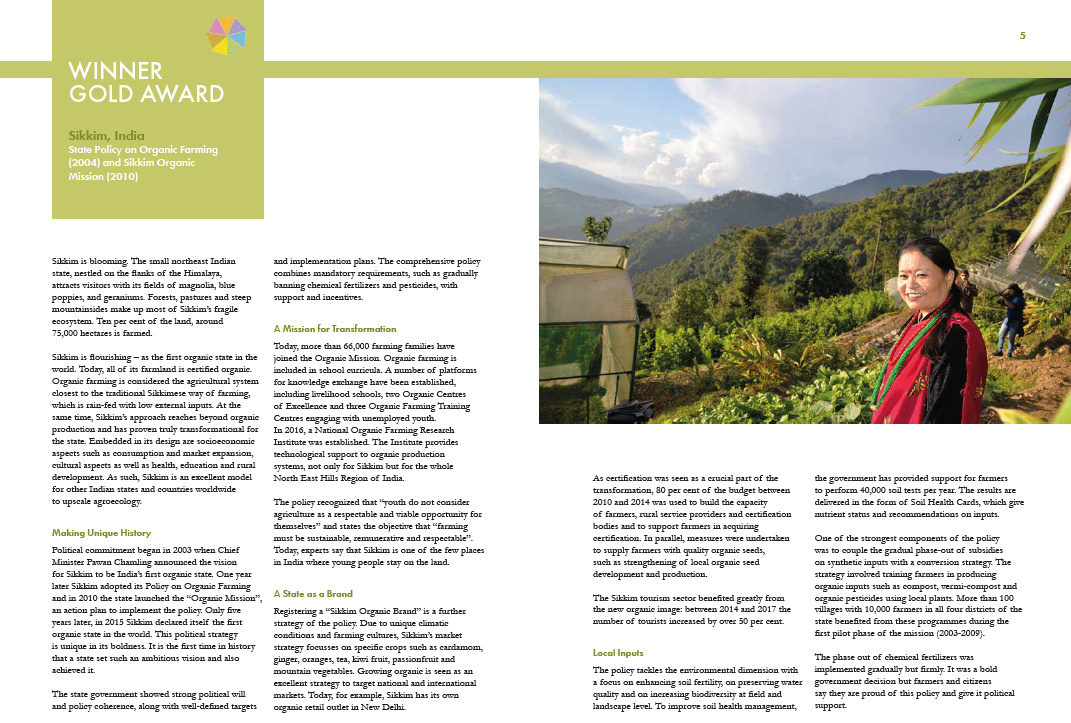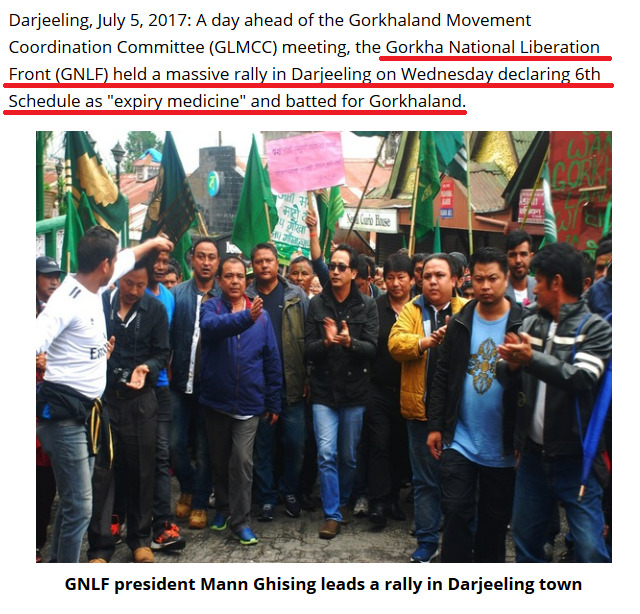Future Policy Award 2018 crowns best policies on agroecology and sustainable food systems – The “100% organic state” Sikkim in India wins Gold. Policies from Brazil, Denmark and Ecuador honoured with Silver Awards
The world’s best laws and policies promoting agroecology are awarded the Future Policy Award (FPA) 2018. The “100% organic state” Sikkim, in India, is this year’s winner of the “Oscar for best policies”, beating 51 nominated policies from 25 countries. Policies from Brazil, Denmark and Quito (Ecuador) take home Silver Awards. This year’s award is co-organised by the Food and Agriculture Organization of the United Nations (FAO), the World Future Council (WFC) and IFOAM – Organics International.
The Future Policy Award, which is the only award which honours policies on an international level. Each year, the World Future Council chooses a topic for the Future Policy Award on which policy progress is particularly urgent. In partnership with FAO and IFOAM – Organics International, the 2018 Future Policy Award highlighted policies that scale up agroecology to contribute to the protection of life and livelihoods of small-scale food producers, ensure sustainable food production systems and implement climate resilient agricultural practices.
“By scaling up agroecology, it is possible to tackle malnutrition, social injustice, climate change, and loss of biodiversity. Through effective, holistic policymaking, we can transform our food systems so that they respect people and planet. The 2018 Future Policy Award winners prove that it is feasible – and how. Policymakers across the globe should follow their example and step up similar exemplary political action!” says Alexandra Wandel, Director of the World Future Council.
Gold Prize winner Sikkim is the first organic state in the world. All of its farmland is certified organic. At the same time, Sikkim’s approach reaches beyond organic production and has proven truly transformational for the state and its citizens. Embedded in its design are socioeconomic aspects such as consumption and market expansion, cultural aspects as well as health, education, rural development and sustainable tourism. The policy implemented a phase out of chemical fertilisers and pesticides, and achieved a total ban on sale and use of chemical pesticides in the state. The transition has benefitted more than 66 000 farming families. The Sikkim tourism sector has benefitted greatly from the state’s transition to 100 percent organic: the number of tourists increased by over 50 percent between 2014 and 2017. As such, Sikkim sets an excellent example of how other Indian states and countries worldwide can successfully upscale agroecology.
“This year’s Future Policy Award honours exceptional policies adopted by political leaders who have decided to act, no longer accepting widespread hunger, poverty or environmental degradation. They are committed to better food and agriculture systems, and have achieved unimaginable change,” notes Louise Luttikholt, Executive Director of IFOAM – Organics International. “One of them is Sikkim’s Chief Minister Pawan Chamling who set an ambitious vision and achieved it: Sikkim became the first organic state in the world – 100% Organic is no longer a pipe dream but a reality, serving as an outstanding role model for others to follow.”
Three Silver Awards were granted to:
- Brazil’s National Policy for Agroecology and Organic Production (PNAPO, 2012): In its first cycle of activities PNAPO invested 364 million Euros. Amongst others, it helped 5,300 municipalities to invest 30% or more of their school feeding budgets in organic and agroecological products purchased from family farmers.
- Denmark’s Organic Action Plan (2011-2020, updated in 2015): As a result of the Action Plan, Denmark has the highest market share of organic products in the world, with almost 80 percent of Danes purchasing organic food.
- Quito’s Participatory Urban Agriculture Programme (AGRUPAR, 2002): With over 3 600 urban gardens growing on 32 hectares and more than 21 000 people trained, AGRUPAR fosters food security, increases incomes, and enhances ecosystem functions.
The Vision Award was given to TEEBAgriFood, an initiative of “The Economics of Ecosystems and Biodiversity” (TEEB) by UN Environment. TEEBAgriFood has developed a comprehensive evaluation framework for food systems that helps decision-makers to compare different policies and the market to value food more accurately.
Maria-Helena Semedo, FAO Deputy Director-General, states: “A transition to sustainable food and agriculture systems is critical to achieving sustainable development, and the 2018 Future Policy Award is unique as it highlights policies that advance such a transition. FAO is proud to honour, along with the World Future Council and IFOAM – Organics International, such leadership and political will.”
Winners of this year’s Future Policy Award will be celebrated in a ceremony on 15 October 2018 at FAO headquarters during the World Food Week in Rome. A life webcast is available at http://www.fao.org/webcast/home/en/item/4874/icode/ and photos at: https://flic.kr/s/aHskKjojGW
The Future Policy Award 2018 is co-organised by the World Future Council, FAO and IFOAM – Organics International, with the support of Green Cross International, DO-IT – Dutch Organic International Trade, Sekem Group, Egypt and EcorNaturaSi, Italy.
CONGRATS SIKKIM… YOU HAVE MADE US ALL VERY PROUD






Leave a comment